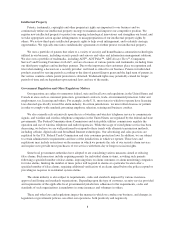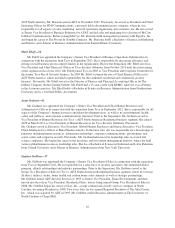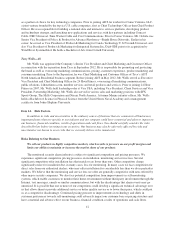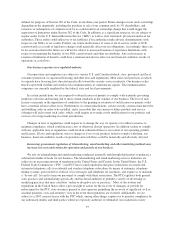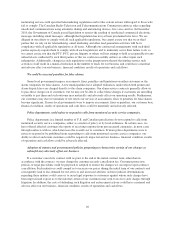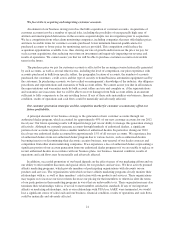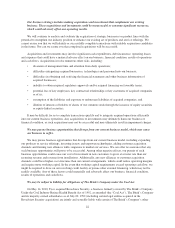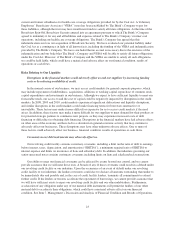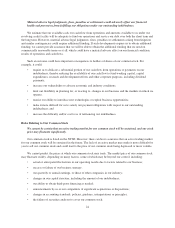ADT 2012 Annual Report Download - page 109
Download and view the complete annual report
Please find page 109 of the 2012 ADT annual report below. You can navigate through the pages in the report by either clicking on the pages listed below, or by using the keyword search tool below to find specific information within the annual report.We have entered into non-compete and non-solicit restrictions that prohibit us from competing with Tyco
in the commercial security market in the United States and Canada for a period of time after the
Separation.
In conjunction with the Separation, we have entered into a Separation and Distribution Agreement with
Tyco that includes non-compete provisions pursuant to which we are prohibited from competing with Tyco in the
commercial security market in the United States and Canada, subject to certain small business related exceptions,
for two years after the distribution date, September 28, 2012. In addition, the Separation and Distribution
Agreement with Tyco contains non-solicitation provisions preventing us from soliciting Tyco’s existing security
customers in the United States and Canada for two years after the distribution date. This effectively prevents us
from expanding our business into the commercial security market, other than the small business market, in these
jurisdictions during the restricted periods. These factors could materially and adversely affect our business,
financial condition, results of operations and cash flows.
Expiration of non-competition agreements will allow the entry of potential competitors with deep
knowledge of our business.
We acquired Broadview Security in 2010. In connection with the separation of Broadview Security from
The Brink’s Company in 2008 (the “Broadview Spin-Off”), Broadview Security and The Brink’s Company
entered into a non-competition and non-solicitation agreement pursuant to which The Brink’s Company agreed
not to compete with Broadview Security in the United States, Puerto Rico and Canada with respect to the security
alarm systems or personal emergency response systems businesses for a period of five years from the date of the
Broadview Spin-Off. Upon the expiration of the non-competition and non-solicitation agreement in October
2013, The Brink’s Company will be free to directly pursue competitive activities in these businesses or to license
the Brink’s brand to other existing or potential competitors in these businesses. In addition, although the
Separation and Distribution Agreement with Tyco that we entered into in connection with the Separation includes
non-competition provisions, the non-competition provisions will expire two years after the distribution date, at
which time, Tyco will be free to compete with us in the residential and small business security market. Such
competitive activities could have a material adverse effect on our business, financial condition, results of
operations and cash flows.
Shifts in our customers’ choice of, or telecommunications providers’ support for, telecommunications
services and equipment could adversely impact our business and require significant capital expenditures.
Certain elements of our operating model have historically relied on our customers’ continued selection and
use of traditional land-line telecommunications to transmit alarm signals to our monitoring centers. There is a
growing trend for customers to switch to the exclusive use of cellular, satellite or Internet communication
technology in their homes and businesses, and telecommunication providers may discontinue their land-line
services in the future. In addition, many of our customers who use cellular communication technology for their
security and home/business automation systems use products that rely on 2G technology, and telecommunication
providers may discontinue their 2G services in the future. The discontinuation of land-line, 2G cellular and any
other services by telecommunications providers in the future will depend on a number of factors outside of our
control, including legislation and government regulation, and would require customers to upgrade to alternative,
and potentially more expensive, technologies to transmit alarm signals. This could increase our customer attrition
rates and slow our new customer additions. In order to maintain our customer base that uses security and home/
business automation system components that are or could become obsolete, we may be required to upgrade or
implement new technologies, including offering to subsidize the replacement of customers’ outdated systems at
our expense. Any such upgrades or implementations could require significant capital expenditures and also divert
management’s attention and other important resources away from our customer service and sales efforts. In the
future, we may not be able to successfully implement new technologies or adapt existing technologies to
changing market demands. If we are unable to adapt timely to changing technologies, market conditions or
customer preferences, our business, financial condition, results of operations and cash flows could be materially
and adversely affected.
17



